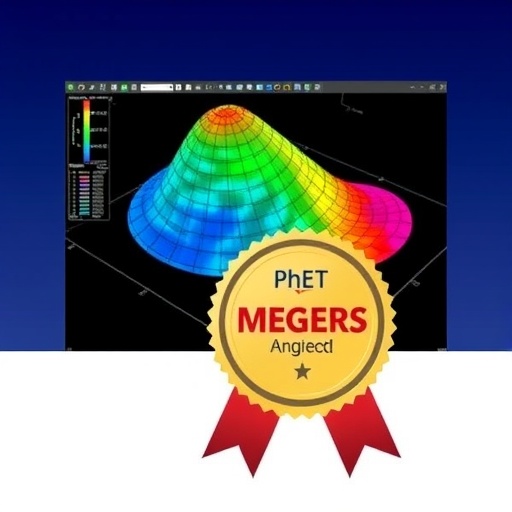The American Institute of Physics (AIP) has recently bestowed its prestigious William F. and Edith R. Meggers Project Award, valued at $25,000, upon the innovative PhET Interactive Simulations team at the University of Colorado Boulder. This recognition celebrates their groundbreaking initiative titled “Electricity and Magnetism with PhET Interactive Simulations: A Professional Learning Course and Community for Teachers,” which promises to reshape high school physics education by empowering educators worldwide. The award, distributed biennially, emphasizes projects that elevate the quality and engagement of physics education in U.S. high schools, aligning directly with AIP’s mission to foster enthusiasm and excellence in physical science teaching.
Physics education stands at a critical juncture as science curricula evolve amidst technological advances and shifting student interests. Michael Moloney, CEO of AIP, underscored the urgent need for robust physics programs to invigorate the discipline’s future. He praised PhET’s submission as an exemplary model, heralded for its innovative approach, sustainability, and scalability. The program is designed not only to address knowledge gaps but to cultivate pedagogical strategies that instill confidence in educators, ultimately enhancing student comprehension and fascination with physics concepts.
PhET Interactive Simulations, launched in 2002, has emerged as a transformative open educational resource (OER) platform, offering interactive, browser-based simulations that vividly illustrate phenomena in physics, chemistry, biology, earth sciences, and mathematics. Hosting over 170 simulations, this resource is globally accessible and multilingual, with translations available in more than 130 languages. These simulations enable students to conduct virtual experiments, manipulating variables and visualizing outcomes in ways that traditional textbooks cannot replicate, thereby deepening conceptual understanding.
At the helm of PhET’s international outreach is Rebecca Vieyra, the Director of Global Initiatives, whose work centers on forging strong connections with educators worldwide. She manages program development, secures funding collaborations, and spearheads the expansion of PhET’s teacher training initiatives. Thanks to the recent Meggers Project Award, Vieyra’s team is poised to scale their training efforts, equipping more teachers with the tools and confidence necessary to integrate PhET simulations into their classrooms. This expansion already spans more than 35 countries, illustrating the project’s far-reaching impact beyond American borders.
Vieyra expresses profound satisfaction in witnessing science knowledge transcend cultural and linguistic frontiers through the shared enthusiasm of teachers and students. The inclusive nature of PhET’s simulations fosters equity in science education by providing free and adaptive learning resources tailored to diverse educational environments. This global community-building around physics education signifies a paradigm shift where open-source digital tools become central to fostering worldwide scientific literacy and engagement.
The mentorship lineage guiding Vieyra’s journey reflects the overarching importance of collaborative support within the scientific and educational communities. She credits her development to inspirational mentors including physicists Tom Holbrook and Carl Wenning, and Robert Hilborn, formerly with the American Association of Physics Teachers, as well as Kathy Perkins, current PhET director. This network exemplifies how sustained mentoring relationships can nurture educational innovators who, in turn, create transformative learning opportunities for others.
The Meggers Project Award symbolizes more than a financial endorsement for Vieyra; it embodies collective recognition of the PhET team’s dedication and impact. It equips them with resources essential for cultivating a professional learning community where physics teachers can share best practices and continually refine their instructional use of simulations. Such communal growth is pivotal for lasting improvements in physics pedagogy, which require ongoing reflection and adaptation to pedagogical innovations.
PhET’s focus on electricity and magnetism simulations addresses core topics that underpin modern technology and engineering disciplines. Understanding electromagnetic principles is vital for students aspiring to careers in STEM fields. By incorporating interactive simulations that model electric fields, circuits, and magnetic forces, the course enhances conceptual clarity, allowing learners to experiment with parameters safely and intuitively. This approach mitigates common misconceptions that arise from abstract textbook descriptions, fostering deep cognitive engagement with fundamental physics laws.
The new professional learning course developed through this grant will enhance teachers’ fluency not only in the content but also in the pedagogical frameworks that maximize the educational value of simulations. By engaging educators in active learning about how students interact with virtual experiments, the program encourages adoption of instructional strategies grounded in research-based evidence. Such professional development initiatives are critical for transforming classroom dynamics and overcoming resistance to integrating digital technologies effectively.
Expanding teacher networks globally, PhET leverages digital connectivity to build communities of practice, where educators exchange lesson plans, troubleshoot challenges, and inspire pedagogical creativity. These communities serve as catalysts for systemic change in physics teaching, extending the reach of innovations introduced in isolated classrooms to entire educational systems. This model aligns with emerging educational research emphasizing the social dimension of teacher learning and its influence on student achievement.
The broader implications of PhET’s work and the Meggers Project Award highlight a strategic investment in the future workforce’s scientific literacy. As technological innovation accelerates, a robust foundation in physics is indispensable. By democratizing access to high-quality, interactive physics education resources and empowering educators worldwide, PhET contributes to cultivating a scientifically competent and curious generation. This endeavor reflects AIP’s commitment to advancing the physical sciences in ways that serve humanity’s long-term societal and technological progress.
Rebecca Vieyra’s leadership epitomizes the power of combining technical expertise with educational advocacy to effect meaningful change. Her vision transcends delivering simulations; it involves weaving a sustained, vibrant fabric of scientific inquiry and passion among teachers and learners. As PhET continues to evolve with the support of awards like Meggers, the nexus of technology, pedagogy, and community exemplifies a powerful blueprint for revitalizing science education globally.
Subject of Research: Physics Education, Interactive Simulations in Electricity and Magnetism
Article Title: PhET Interactive Simulations Receives Prestigious Award to Revolutionize High School Physics Teaching
News Publication Date: October 30, 2025
Web References:
- American Institute of Physics: http://www.aip.org/
- PhET Interactive Simulations: https://phet.colorado.edu/
Image Credits: Rebecca Vieyra, PhET Interactive Simulations
Keywords: Science education, Physics teaching, High school teaching, Electricity and magnetism, Interactive simulations, Educational technology, Teacher professional development, STEM education, Physics literacy, Open educational resources, Global science education, Pedagogical innovation




